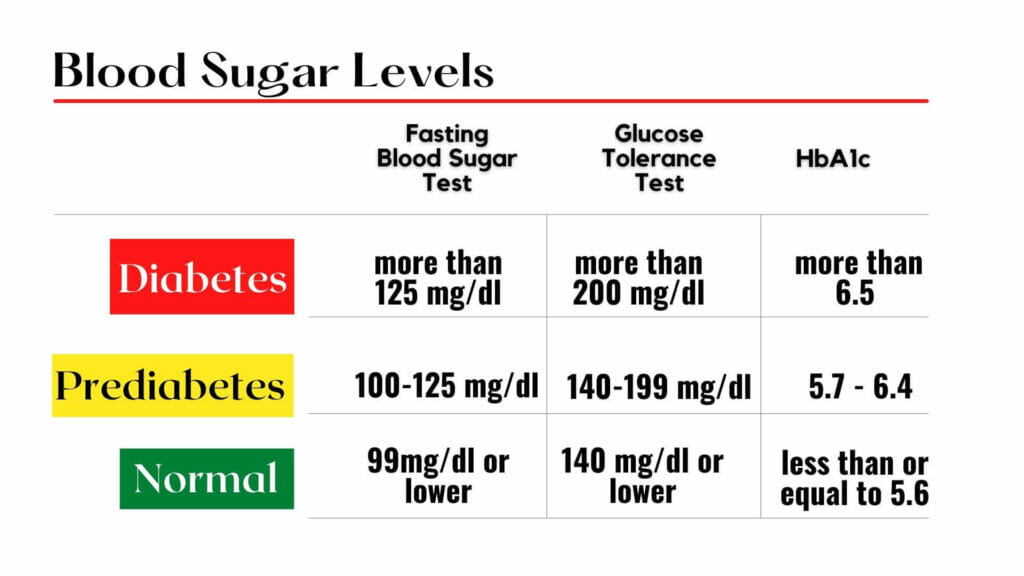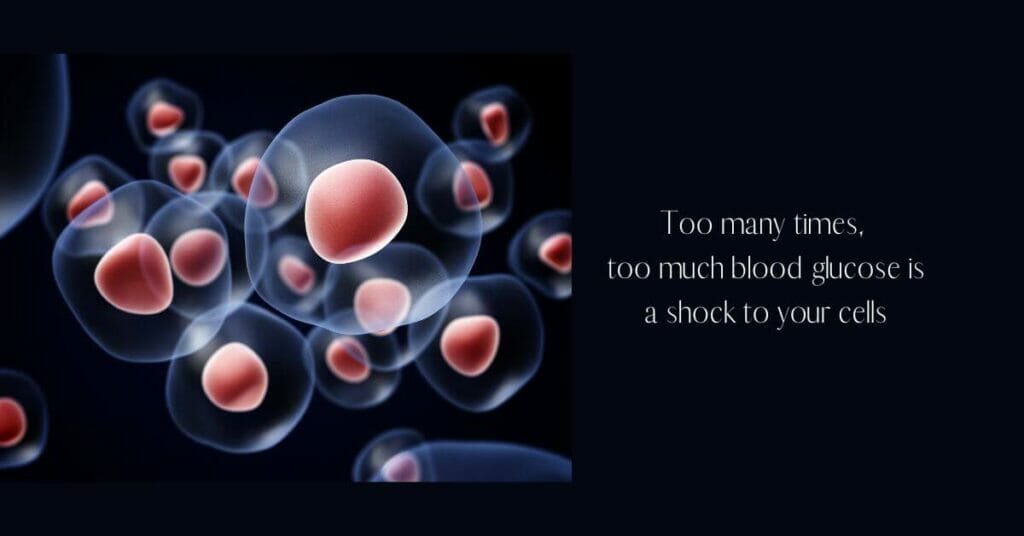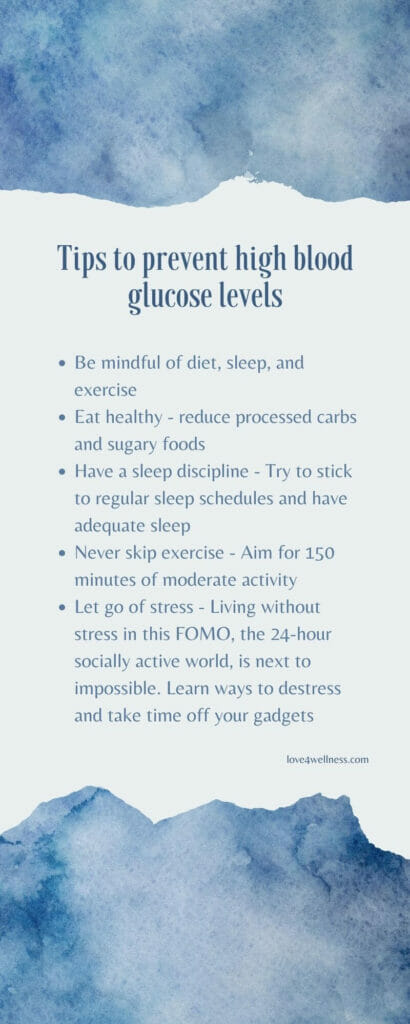High blood glucose levels are often linked to diabetes, but blood sugar spikes can happen in non diabetics as well. Regular blood sugar spikes can have short-term and long-term effects on your health. Knowing why blood sugar spikes are bad, how to prevent them and minimising the occurrences are crucial to make you feel healthy and well in the long run.
Glucose is the body’s preferred energy source and our bodies require an optimal level of blood sugar for normal functioning. However, too much of anything is not good, so things go awry when blood glucose goes up much higher than normal.
Interestingly, several things are going on inside the body to maintain blood sugar levels, but we aren’t getting into them. Instead, our focus is on how high blood glucose levels cause harm, both short-term and long-term.
“Simply put, your blood sugar levels should not go below 70 and above 140.
What is a blood sugar spike?
A blood sugar spike occurs when glucose builds up in your bloodstream, causing a steep increase in blood sugar levels. A spike in blood sugar is normal after eating even in non diabetics. However, when that rise is very high, it becomes a problem. Also, frequent and consistent spikes are a concern.
So, when are blood sugar spikes bad for you, what harm do they have on your health, and can you prevent or manage them from shooting too high? If yes, how? Here is all you need to know.
Blood sugar levels after eating:
Our blood sugar levels increase after meals or snacks. For non-diabetic people, the rise will not go beyond 140 mg/dl. When it is between 140-199 mg/dl, it might signify that you may develop diabetes. When the increase goes beyond 200 mg/dl, it gets problematic. And most often, such blood sugar spikes are found only in people with diabetes. Such levels in people without diabetes mean trouble.
The infographic below gives detailed information on blood sugar levels:
Why are blood sugar spikes bad?
Blood glucose keeps fluctuating in everyone, regardless of whether they have diabetes or not. Especially when you eat a high-carb meal, the spike will be significant.
Such single spikes are not going to render any harm as serious as type 2 diabetes may cause. But consistent spikes over a long period are surely not good.
You may know that mitochondria are the powerhouse of the cells as they generate energy from food. However, during this process, they also produce free radicals. While free radicals are essential, too many of them will cause oxidative stress, damaging cells, tissues, and DNA and accelerating ageing.
When mitochondria are frequently drowned with glucose, much higher than necessary, they produce more free radicals, resulting in increased oxidative stress. In addition, long-term hyperglycemia may cause mitochondrial dysfunction and reduced insulin sensitivity by cells.
“And, most often, glucose spikes in normal people are not noticeable until they have started the damage to your body. So it is beneficial to know what causes such spikes and how to prevent them.
What harm can blood glucose spikes cause?
Long-term effects:
High blood glucose reduces the elasticity of blood vessels and can damage arteries. Over time, the blood vessels narrow, restricting blood flow which might cause hypertension.
Apart from heart diseases, hyperglycemia can also damage nerves, tissues, and many other organs.
In addition, if your unhealthy diet is the reason for high blood sugar levels, then you may also experience weight gain, insulin resistance, an increased risk of diabetes, and elevated triglycerides.
Usually, the issues crop up only after significant damage to your body, typically when you will also find that you have diabetes.
Hence, for people over 40 years of age, getting your blood glucose checked every six months or at least once a year is useful.
Short-term effects:
Your weekend dinner turned out to be lavish and sumptuous, with lots of delicious carbs. Can that spike your blood sugar levels even though you do not have diabetes? Yes, it can.
Will the spike cause any problems? Yes, most symptoms of high blood sugar in non diabetics resemble early diabetes’ symptoms, such as excessive thirst and urination, nausea, and abdominal discomfort. You may also feel lousy and lazy. Further, high blood sugar increases the risk of acne by 30%.
Do blood sugar spikes occur only in people with diabetes?
A common belief is blood sugar spikes can happen only in people with diabetes. Does that mean non diabetics never experience high blood sugar (hyperglycemia)? No, in some situations, non-diabetics can also get blood sugar spikes.
Further, studies find that factors such as microbes living in your gut vary your response to specific foods. So genetics play a part too. While you may have stable glucose readings after eating a certain food, your friend might spike blood sugar levels with the same food.
Hence, it is not uncommon for someone without diabetes to experience hyperglycemia.
You Might Also Like:
- The Three Important Aspects To Understand When Managing Diabetes And Ten Important Tips That Helps
- Fight Diabetes Naturally With These Nine Herbs and Spices!
12 Causes of high blood sugar in non-diabetics
Hyperglycemia can occur in people without diabetes due to various reasons.
Pancreatic diseases
An impaired pancreas means impaired insulin secretion. Hence, any disorder or condition of the pancreas can cause hyperglycemia even when you do not have diabetes.
Cushing’s syndrome
This disorder develops when the body produces or is exposed to excess cortisol. Cortisol hinders the body’s ability to use insulin; hence you may develop glucose intolerance. Several reasons may cause Cushing’s syndrome, so you must take medical advice to treat the condition.
PCOS
Polycystic ovarian syndrome (PCOS) is a condition in menstruating women where male hormones are produced in excess. Women with this condition are usually insulin resistant, hence may experience hyperglycemia often.
Obesity
Excess weight, particularly in the abdomen (visceral fat), can make you more insulin-resistant. Hence, high blood sugar levels may occur in non-diabetics with abdominal fat.
Little or no physical activity
Physical activity demands your muscles to use glucose. Being less active for long periods makes you insulin-resistant and may cause blood sugar spikes after meals.
High-carb, high-sugar diet
This is a no-brainer; when you supply carbs and sugars in huge amounts, the blood sugar can spike resulting in high blood sugar levels.
Severe infections (UTI, Pneumonia, etc.)
Your blood sugar levels may spike when you are seriously sick with illnesses such as urinary tract infections (UTI).
High blood pressure
Studies find that people with hypertension are usually less responsive to insulin, hence prone to blood sugar spikes and an increased risk of type 2 diabetes.
Gestational diabetes
Women with diabetes during pregnancy may often experience post-meal blood sugar spikes.
Certain medications
Medications such as antidepressants and corticosteroids can cause high blood sugar levels.
Trauma
Trauma such as losing a loved one or a severe injury triggers hyperglycemia due to the stress response from your body.
Stress
During a stressful event, your body produces cortisol, which in turn triggers some bodily functions that increase blood sugar levels so that your body has adequate energy for the flight/fight response. However, when the stress is not ending any soon and is consistent, the cortisol levels remain high for longer, resulting in frequent hyperglycemia episodes.
7 Simple Tips to prevent hyperglycemia in people without diabetes:
If your genetics or lifestyle is the culprit behind the spikes, the following tips can help prevent an abrupt increase.
1. Diet
Food is the most important aspect if you want to prevent a sharp increase in post-meal blood sugar levels. In addition, if you take consistently healthy meals consisting of healthy carbs, low sugar, adequate protein, and healthy fats, you can also address other problems, including obesity and PCOS, which can also cause high blood sugar.
Intermittent fasting helps improve insulin sensitivity. At the least, you may aim to have an early dinner by 8 pm and have your first meal the next day by 8 am. 12-hour fasting not only helps improve insulin sensitivity but also burns visceral fat.
Also Read: Protein In Every Meal Help Reduce Blood Sugar Spikes. Why?
2. Exercise
Exercise is the next equally important aspect of maintaining healthy blood sugar levels. Generally prescribed is moderate activities for 150 minutes spread over a week. If you have a busy week, be a weekender and fit in your exercise during the weekend.
Also, do not sit or lie down immediately after a meal. A slow walk or a mild physical activity for 20 minutes post-meal is beneficial to prevent blood sugar spikes.
If the 150-minute workout is not possible, aim for fast walking every day for about 10 to 20 minutes.
3. Hydration
Your blood sugar becomes more concentrated when your body is dehydrated.
For example, a nice lemonade should contain 3 tbsp of lime juice and a cup of water. If you reduce the water to 1/2 cup, your lemonade is concentrated with lime and tastes quite tart. Similarly, blood sugar gets concentrated when water content goes low, resulting in spikes.
So, drink adequate water to maintain optimal blood glucose levels. How much is adequate? Drink plain water when thirsty.
4. Sleep
Sleep is probably the most underrated aspect, which can increase the risk of insulin resistance in a person.
Several studies show that disturbed sleep, irregular sleep, and insufficient sleep all contribute to insulin resistance. A deep concern in adolescents and young adults, sleep discipline, plays a huge role in reducing the risk of developing type 2 diabetes later in life. Hence, erratic or irregular sleep patterns should be improved to prevent blood glucose spikes.
5. Healthy weight
Maintaining a healthy weight can not only prevent blood sugar spikes but can also prevent heart ailments, cancers, sleep apnea, osteoarthritis, etc.
6. Limit alcohol
You may think that alcohol consumption can only lower your blood sugar, but over time, too much drinking can make you insulin resistant. Also, unmindful alcohol consumption when young is linked to a 30% increased risk of type 2 diabetes in later years. So limiting alcohol is critical if you are experiencing blood sugar spikes and want to prevent them.
7. No smoking
Nicotine in cigarettes can alter cells, making them less responsive to insulin. This may cause post-meal blood sugar increase.
- Treatment is necessary if pancreatic diseases or Cushing’s syndrome is causing your blood sugar spikes.
- If any of your medications are the cause, talk to your doctor and follow his advice.
- Trauma (such as the loss of a loved one), injury, or severe infection must be dealt with with necessary treatments.
The bottom line
Diabetes is a chronic condition affecting people worldwide. They lead to many other health problems and can significantly reduce your quality of life.
Hence, if you are genetically predisposed to diabetes or have an unhealthy lifestyle with a poor diet, less physical activity, and a bad sleep routine, you will likely experience high blood sugar levels now and then.
In such a case, you may be mindful of your food choices, regular physical activities, and sleep routine. Further, limit alcohol consumption and quit smoking. Reducing your stress is also very important to maintain healthy blood glucose levels.
On the other hand, if pancreatic diseases, Cushing’s syndrome, emotional trauma, or serious injury or illness is causing blood glucose spikes, it is crucial to take medical advice.
Prevention is always better than cure. It is evident that frequent blood sugar spikes and high blood sugar levels eventually lead to insulin resistance. So, prevent blood sugar spikes today to prevent health ailments such as obesity, heart disease, and diabetes later in life.
Images: canva.com



